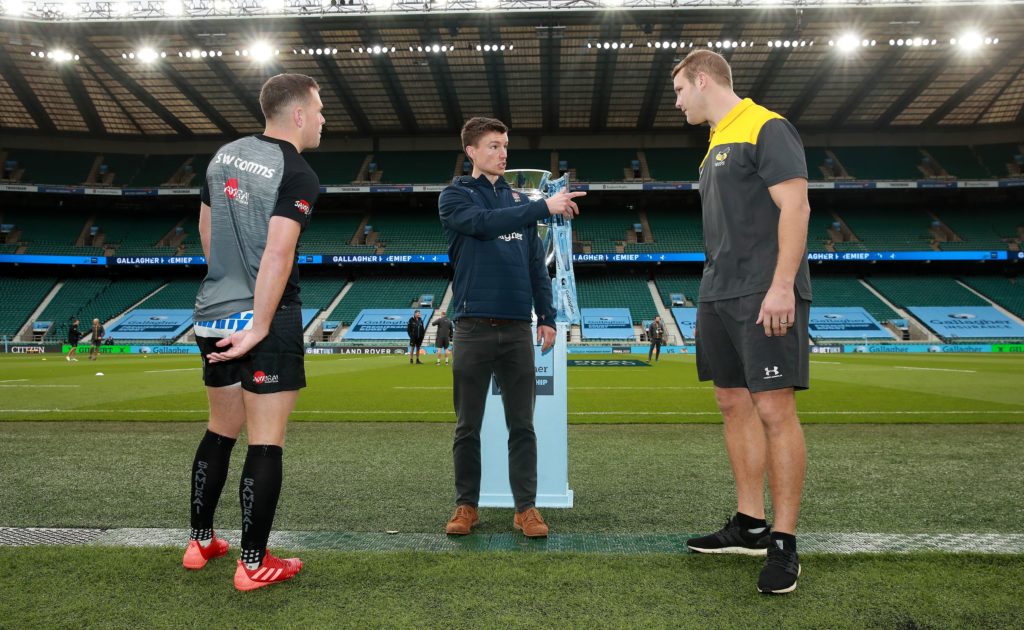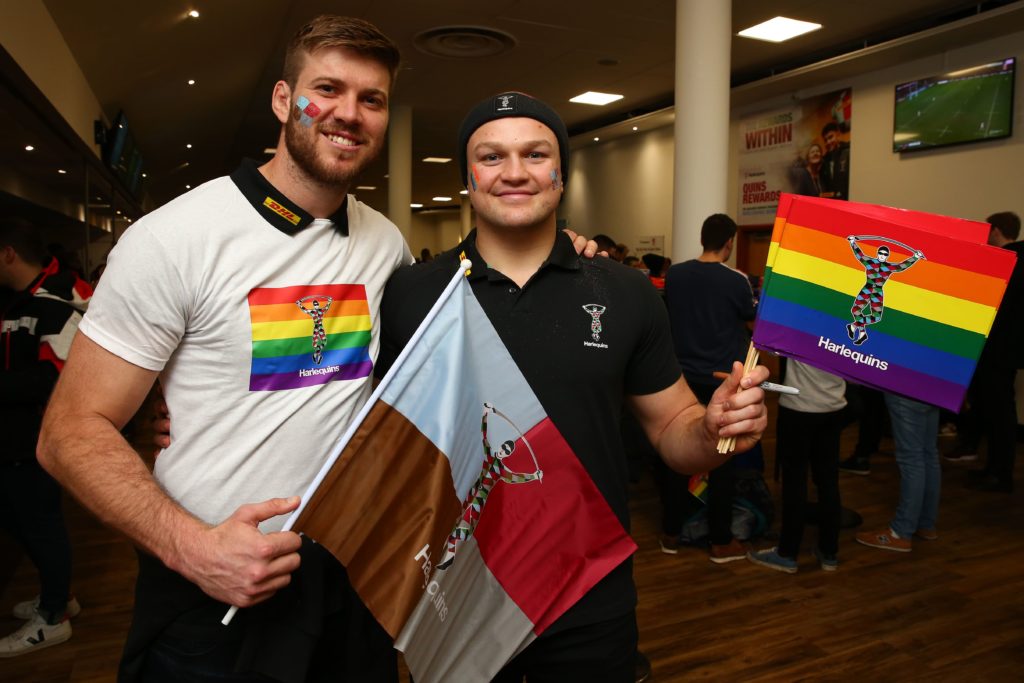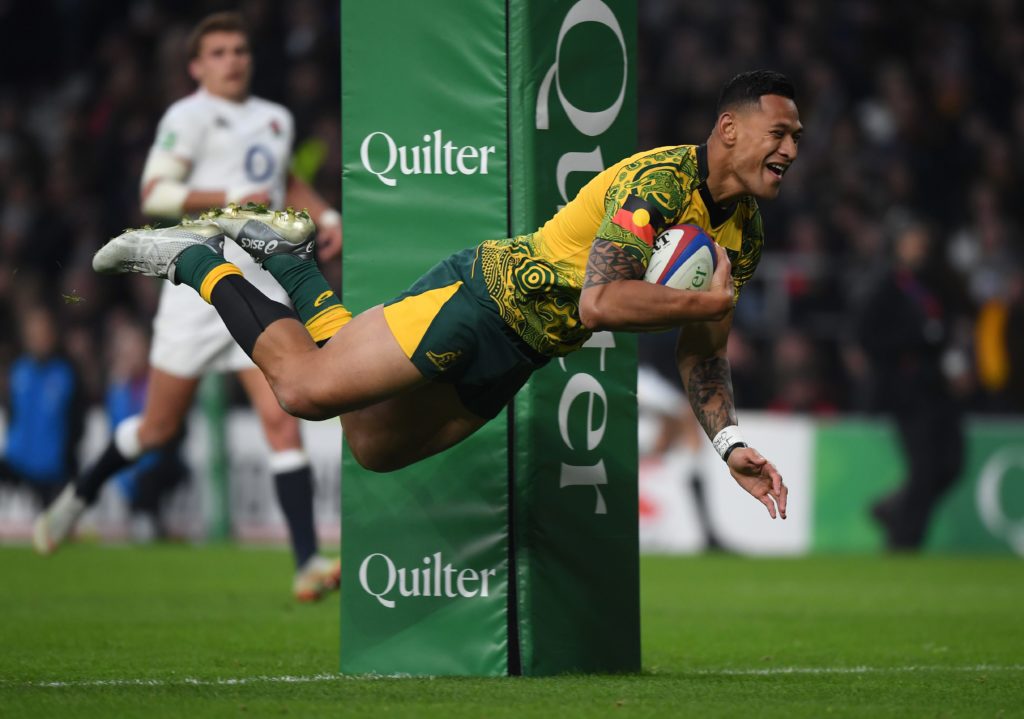Lord Hayward is between Zooms. He is only really able to speak to me because a minister has let him down. I laugh at being thrust into such company. He laughs too. When you speak to him, bouts of giggling pepper the conversation. The whole discussion ticks along like a well-kept clock; he is one of those people whom you feel you’ve met before. Not just met, got along with very well with. And yet, beneath all the stories of governmental corridors and clubhouse shenanigans that make you smile and think, is one of the most interesting men in rugby union.
Now a peer and an overly-active member of the House of Lords, Robert Hayward was once a well-regarded referee. His love of the sport was formed during school and, because of a dire need to wear glasses when he played, he quickly found the whistle. He refereed the first-ever inter-parliamentary game between England and France in 1991. And was told by Steve Leyshon, a few years after retiring, that he should have refereed at Twickenham.
He was also a Member of Parliament for Kingswood between 1983 and 1992. He was a private secretary to the Minister for Transport during the Lockerbie bombing and the Clapham and Kings Cross rail disasters. He lost his seat in the 1992 election and then went on to be chief executive of the Beer and Pub Association for 10 years. He was awarded an OBE for his work with families of Gulf War hostages and served on a variety of boards and acted as an adviser and non-executive director to a host of well-known organisations and groups.
I was an MP, a referee and wearing glasses; you can imagine what they said. If only they’d known I was gay as well!
Lord Hayward
And, all the while, was perfecting an incredible ability to foresee political voting trends: swimming against the tide, he correctly predicted the 2015 general election result and the 2016 EU referendum, making him now, one of the most sought after psephologists around. He was also the first chairman of the groundbreaking rugby club, the Kings X Steelers.
And he is gay.
Hayward’s Bristolian accent is a thing of beauty. It dips and swirls majestically as he recollects certain situations. You can hear how living and working in London has clipped certain words and phrases but it isn’t long before he is elongating his vowels to wonderful effect. It was also a favourite of board meetings at the Steelers.
“Every time, without fail, I handed round the agenda, there it was as an item for discussion: kit! I wrote kit because I knew what they wanted me to say. The bastards just wanted to hear shurts and shoarts! And I would too, to howls of laughter!”
My first piece of cross-examination is into refereeing. Why do that to yourself?
“I wasn’t a good player and as I say, I had worn glasses since being a child; in those days refereeing was a way to be involved. I still run the line if I can and adore it. It was a sense of release, especially when I was working as an MP. You can completely immerse yourself in it. Not think about anything else. That said, there were side effects: I wouldn’t be sick but the nerves would get the better of me and I would physically heave in the changing room before every game.
 Exeter Chiefs captain Joe Simmonds and Wasps skipper Joe Launchbury.” class=”wp-image-10097″ />
Exeter Chiefs captain Joe Simmonds and Wasps skipper Joe Launchbury.” class=”wp-image-10097″ />“But I never felt insecure on the pitch. Maybe that was it. Even when I’d get comments thrown my way, my calls questioned, I would never feel intimidated. Don’t get me wrong, I would wrestle with decisions I failed to make. I remember being told by an assessor that I had a chronic habit that the players could see. If I got something wrong in the game, I’d thump myself on the thigh, to the point that bruising would appear. I was so involved in the whole game.
“I loved the way the players would try and talk to you. I was told I let them talk too much, but it all just washed over me. The comments would make me smile. I was an MP, a referee and wearing glasses; you can imagine what they said. If only they’d known I was gay as well!
“I learnt so much from the sport. Perhaps a lot that has affected other things in my life. My appreciation of the impact I have on other people. The way you can review, to the point of obsession, but make sure you take the positives and negatives in equal measure. I am always reviewing. I remember Nigel (Owens) and I went out for dinner after a game he’d done and I was asking him why he stood in a certain position, at a certain point in the game. And he was telling me about the slope in the pitch, how he had to stand there because he wouldn’t have been able to see properly… People at the neighbouring table must have wondered what we were going on about. But I can’t help it; I love the way the game gives you a chance to learn.”
But our conversation does get heavier. We move from the idea of love to that of hate. Eamonn Ashton-Atkinson’s moving film about the Kings X Steelers is about to make a telling entrance at the Glasgow Film Festival, and as other projects like ‘It’s A Sin’ are making similar sorts of impressions, I ask Lord Hayward about the animosity he has faced down as part of a gay rugby club, and how that has made him feel.
We had teams renege on fixtures as they had players withdrawing because of the fear of transmission of AIDS.
Lord Hayward
“In 1996, I became chairman (of the Steelers). I didn’t put myself forward but with the other work I’d done, it was a straightforward decision to put me into the role. I think the main feeling towards the club was curiosity; in the main, people wanted to know what we were doing. But we did have some pretty horrible accusations made, and a small group of people were against us.
“We had teams renege on fixtures as they had players withdrawing because of the fear of transmission of AIDS. And, of course, the media coverage spiralled quickly. I was in contact with a national paper about what I thought was a sports story. But as our conversations progressed it became obvious it was to be more than that. The News of the World ran a headline: ‘Harle-queens!’ Many of us found it quite funny but I can see why people found it derogatory.

“It was mostly about not being on a crusade. I think that was what frightened people. The idea we were trying to affect some sort of change. And that was not what we were about. You’ll see that in the film. It’s just about giving people a place to belong. It’s a rugby club, like every other across the land. We were homosexuals, yes, but really, we just wanted to play rugby.
“That phrase still makes me smile: ‘just another rugby club’. I remember using it so much when speaking to people, and then, at the same time, filling out insurance forms from the RFU, in order for us to go on tour: I wonder how many other rugby clubs have a high-profile professional drag queen in their ranks? It does make me laugh.”
Perhaps, most importantly, as well as being ‘just another rugby club’, Kings X Steelers was a place where people who had previously been excluded felt included. It was a safe place for a group of people who would have been facing a great deal of anxiety and uncertainty.
“Yes. It was.” There is a brief pause as Hayward casts his mind back. “I remember speaking to one of our player’s boyfriends on the touchline. It was a casual chat, about how well he was doing on the pitch and then, as simple as anything, he says, ‘Well, without you guys, he’d be dead.’ That makes you take a step back. It is easy to lose sight of that aspect of it all. Amongst the usual clubhouse fun. Moments like that make you think about how important we were. And still are.”
I was really disappointed with the way Saracens dealt with Billy Vunipola off the back of the Israel Folau situation.
Lord Hayward
The ‘And still are’ is like a shoulder barge. I am set on a different course. How far does rugby still have to travel?
“It has done a great deal, come a long way, but it’s a bit like society. For instance, I was really disappointed with the way Saracens dealt with Billy Vunipola off the back of the Israel Folau situation. Their failure to condemn does a great deal of damage.
“One of the groups who aren’t willing enough to speak up is sponsors. People whose money is being used by the club. They are not vocal enough with their dissatisfaction. A company like O’Neill’s, with their name plastered across the Catalan shirt that Folau wears. If we can get them to voice their disapproval of the association, we will get further.
“I wonder if rugby is as comfortable a home as we could make it? I don’t want to out anyone (and I genuinely don’t know any by name) but I can’t believe that there aren’t any other openly gay players in our sport. Why not? Can we do more? Maybe work hand-in-hand with sponsors to make players realise that coming out won’t damage any brand. Get sponsors to speak up and support the idea. Players need to know it’s a safe place for them to be who they are. Rugby union is working hard, look at a club like Harlequins and their work with LGBT History Month, but I think we also need to have a willingness to appreciate there is work still left to do.”
 Australia against England.” class=”wp-image-10099″ />
Australia against England.” class=”wp-image-10099″ />And the people reading this? The average rugby fan – people like me – what can we do?
“We can think about language. We seem to have made big strides as regards race and racist language, but the words we use around rugby need to change: homophobic slurs like pansy and poofter to describe someone missing a tackle, terms that place homosexuality in a derogatory way. We ran surveys with all of our members, and it’s a prevalent theme as to why our members didn’t feel welcome at other clubs. They didn’t find the use of words offensive, per se, but it meant they didn’t feel included. It is tenor, really. How we look after everyone in our rugby conversation.”
And I’m left, holding the phone, having said a fond farewell to Lord Hayward, thinking it might be that simple.
As seemingly complex as the problem may appear, the solution is reassuringly straightforward. Look after everyone. Listen, appreciate and ultimately understand that we are all here for one reason. Rugby. Just rugby.


Comments
Join free and tell us what you really think!
Sign up for free